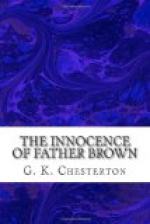The other did not answer.
“If there were no forest, he would make a forest. And if he wished to hide a dead leaf, he would make a dead forest.”
There was still no reply, and the priest added still more mildly and quietly:
“And if a man had to hide a dead body, he would make a field of dead bodies to hide it in.”
Flambeau began to stamp forward with an intolerance of delay in time or space; but Father Brown went on as if he were continuing the last sentence:
“Sir Arthur St. Clare, as I have already said, was a man who read his Bible. That was what was the matter with him. When will people understand that it is useless for a man to read his Bible unless he also reads everybody else’s Bible? A printer reads a Bible for misprints. A Mormon reads his Bible, and finds polygamy; a Christian Scientist reads his, and finds we have no arms and legs. St. Clare was an old Anglo-Indian Protestant soldier. Now, just think what that might mean; and, for Heaven’s sake, don’t cant about it. It might mean a man physically formidable living under a tropic sun in an Oriental society, and soaking himself without sense or guidance in an Oriental Book. Of course, he read the Old Testament rather than the New. Of course, he found in the Old Testament anything that he wanted—lust, tyranny, treason. Oh, I dare say he was honest, as you call it. But what is the good of a man being honest in his worship of dishonesty?
“In each of the hot and secret countries to which the man went he kept a harem, he tortured witnesses, he amassed shameful gold; but certainly he would have said with steady eyes that he did it to the glory of the Lord. My own theology is sufficiently expressed by asking which Lord? Anyhow, there is this about such evil, that it opens door after door in hell, and always into smaller and smaller chambers. This is the real case against crime, that a man does not become wilder and wilder, but only meaner and meaner. St. Clare was soon suffocated by difficulties of bribery and blackmail; and needed more and more cash. And by the time of the Battle of the Black River he had fallen from world to world to that place which Dante makes the lowest floor of the universe.”
“What do you mean?” asked his friend again.
“I mean that,” retorted the cleric, and suddenly pointed at a puddle sealed with ice that shone in the moon. “Do you remember whom Dante put in the last circle of ice?”
“The traitors,” said Flambeau, and shuddered. As he looked around at the inhuman landscape of trees, with taunting and almost obscene outlines, he could almost fancy he was Dante, and the priest with the rivulet of a voice was, indeed, a Virgil leading him through a land of eternal sins.




